Chinas Friedenstauben für die Global Security Initiative: General Milley und KMT- Ma Yingjiu
Die KP China hat zwei Friedenstauben für sich entdeckt, eine in den USA, eine in Taiwan, die sie löblich in ihrer Propaganda hypt. Zum einen den Generalstabschef Mark Milley, den sie als Taube/dove bezeichnet, wie auch den ehemaligen taiwanesischen Präsidenten ( KMT) Ma Yingjiu, der sich zeitgleich zur Reise der jetzigen Präsidentin Tsai Ying von der DDP in die USA zu einer 12-tägigen Reise durch China angesichts des gemeinsamen Qingming–Ahnengedenkensfeiern und dessen Märtyrerkult als Gegenpol begeben hat und dafür seitens der KP China feierlich gelobt wird. Die Taipeh Times schreibt auch dass Tsai, DDP und Ma/ KMT mittels ihrer Besuche zwei unterschiedliche Pole bildeten: Den taiwanesisch-demokratisch-friedlichen Richtung USAversus den ethnisch-chinesisch-völkisch-autoritär- hanchauvinistisch-imperialen Richtung KP China und Großchina.. .
Doch zuerst, was die Global Times über die Friedenstraube Generalstabschef Milley alles Schmeichelhafte schreibt im O- Ton:
“US military is becoming a dove, as career soldiers know real American capabilities
By Global Times Published: Apr 03, 2023 08:40 PM
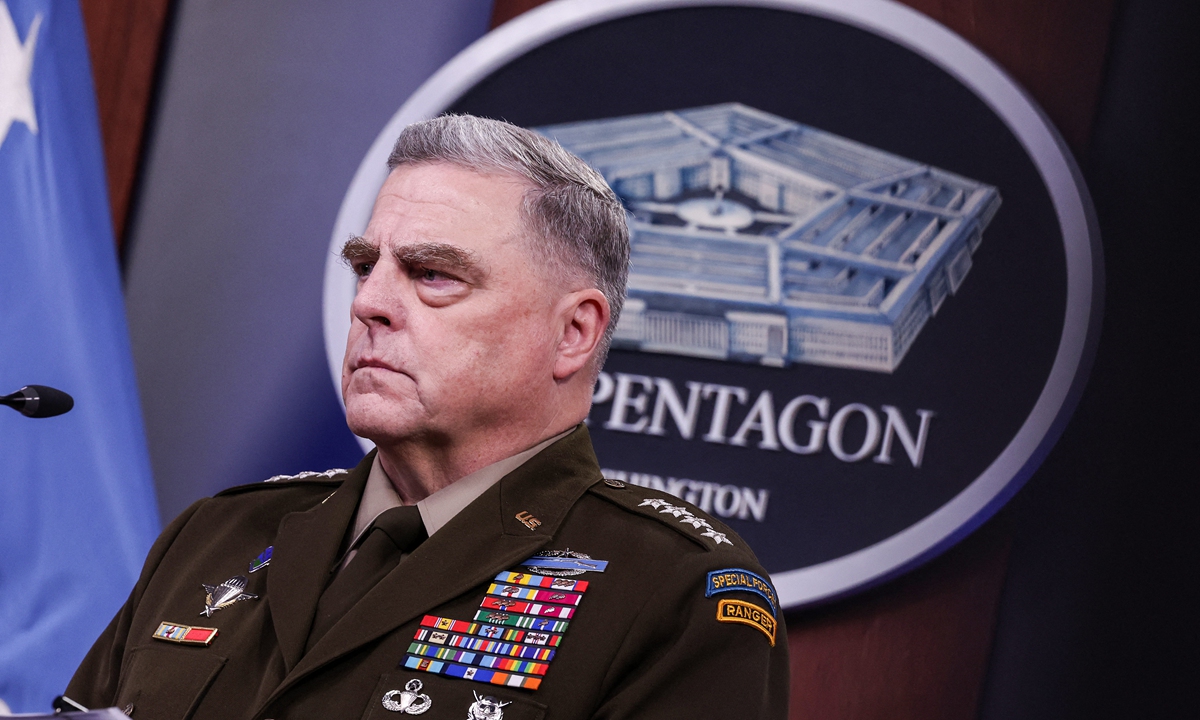
US Joint Chiefs of Staff Chairman General Mark Milley Photo: AFP
As US armchair politicians and analysts are hyping up a possible war, true American warriors are calling for peace. Everyone needs to calm down about war with China, top US general Mark Milley said on Friday in an interview with Defense One. On Monday, Taipei Times published a front-page story featuring Milley’s rhetoric.
According to Defense One, the China heat is on following this year’s Chinese balloon saga. In the past few weeks, members of Congress in hearings aimed a list of concerns about China – everything from nuclear weapons to computer chips, „invading“ Taiwan, and allying with Russia – at Milley and Defense Secretary Lloyd Austin. „Milley has taken to telling lawmakers that war with China – and Russia – is not imminent or inevitable. It’s part of an effort to lower the heat,“ Defense One reported, citing Milley and adding that Milley stressed a more realistic and less emotional approach is needed when dealing with China-US ties.
Milley clearly recognizes the predicament the US faces amid US politicians and media’s excessive hype of tensions with China. To some extent, he was saying that something has gone wrong in the US‘ China policy, and the problem is mainly on the US side.
As a career soldier, Milley realizes when the US displays overly hawkish hostility against China, it goes far beyond the actual needs of American national interests. Thus, he made his point – the US military should not be dragged into a war with China for hysterical reasons, in other words, for the constant hype of unreasonable tensions, Shen Yi, a professor at Fudan University, told the Global Times.
Taiwan regional leader Tsai Ing-wen is on a visit to Central America with a planned stop-by in California and a scheduled meeting with Republican House Speaker Kevin McCarthy. US officers, think tanks, and media have been sparing no effort to stir up troubles about the Taiwan question long before the trip. They either constantly make speculations on the timetable of a possible cross-Straits war, or simulate war games on the possible American cost of such a conflict.
When American elites who have never fought in a war are obsessed with talking out loud about a military showdown, Milley remains sober. He is well aware that it is not journalists nor politicians who will have to fight on the front lines. And he knows it is not in the US‘ interest to actually fight a war against China. For a career military personnel, it is more important to boost deterrence than actually joining a hot war.
More importantly, it is completely unrealistic for the US to confront both China and Russia militarily simultaneously. Milley is aware of the strength of American military power; thus, he knows that Washington should not provoke Beijing and Moscow at the same time. Otherwise, the US will simply wreck its capability to seek absolute military hegemony worldwide, Song Zhongping, a Chinese military expert and TV commentator, told the Global Times.
Milley’s argument is objective and calculative. After calling for a cooling down of tensions, he said that he prefers the „speak softly, carry a big stick“ tactic – lowering the rhetoric a little bit while making sure the US has an incredibly powerful military that is capable. And he agrees with calls for the US to send arms to Taiwan island as quickly as possible.
It means that despite the fact that the US still has a clear military advantage, such an advantage is no longer overwhelming. Hence Milley believes a military means is not an option before it has a sufficient advantage in the armed forces.
That’s the reason for ceaseless US arms sales to the Taiwan island – the US is not preparing to fight China; it is preparing Taiwan island to fight the Chinese mainland. The US won’t willingly sacrifice itself to help Taiwan secessionist forces, but it is willing to fight a proxy war, using the Taiwan island as a consumable or a pawn.
The US still remains the most powerful country on the globe, but its toxic political environment has been eroding its strength since the end of the Cold War. The toxic environment is what drives Milley’s concerns on whether the US‘ might can be long-lasting.
China’s development and the US‘ decline are not directly related. And the current era is no longer one in which one country can play a dominant role with purely military power. Benign competition can help both China and the US develop. If China becomes strong enough one day, it will be grateful to both its friends and strong competitors, including the US, Song said.
The US is too anxious and hysterical, because it has lost its way and is on the wrong path.
https://www.globaltimes.cn/page/202304/1288490.shtml
Interessant, dass sich Milley trotz aller Russiahawks und Chinahawks so halten kann. Aber möglich, dass viele keine neuen Neoconabenteuer wollen und man in Teilen der Administration und dem Sicherheitsapparat inzwischen auch so denkt und einige denken, dass es mittel- und langfristig bei ausbleibenden gamer changern im Ukrainekrieg , erodierenden politischem Willen und Ukrainesolidarität, Auszehren der eigenen Rüstungsbestände, weiteren Konflikten, vor allem i Asian Pivot und China auf Milleys Korealösung in der Ukraine rausläuft, wobei Milley wichtig sein dürfte, dass ohne Donbass und Krim Odessa ukrainisch bleibt und das Asowsche und Schwarze Meer internationales Gewässer. Da kann er seitens Erdogans auch in der Nato auf Zustimmung hoffen, da dieser auch nicht will dass das Schwarze Meer ein russisches Meer wird.
Darauf deuten auch zwei Zusendungen eines ehemaligen deutschen Diplomaten und Botschafters an Global Review, die auc in Berliner Diplomatenkreisen und über den Teich kursieren:
„Dear friends and colleagues,
please find below an article on Washington D.C.’s current concerns which will probably increase during the next 12 months.
FYI The veteran journalist Julia Ioffe recaps conversations with a range of Washington foreign policy insiders, including some inside the Administration. She underlines that the insiders‘ on the record comments don’t align with their private ones. While they praise President Biden’s response to the Ukrainian crisis, they also criticize him for lack of a specific strategy. She asks all the important questions about what the U.S. will do going forward, makes clear that U.S. policy options rest hugely on the success or failure of Ukraine’s coming spring/summer offensive and reports that there is a general sentiment across party lines that Washington expects stalemate and greater pressure to push Kyiv to negotiate on the basis of the frontlines. A raw account in many respects but probably an accurate portrayal of thinking among the Washington foreign policy establishment.
Biden’s Private Ukraine Deadline The D.C. foreign policy establishment is growing restless as the Biden White House resists calls to articulate a more specific strategy if Ukraine fails to make significant gains by the fall.
JULIA IOFFE JULIA IOFFE
Since the beginning of Russia’s invasion of Ukraine, the White House has held regular calls with prominent people in the Washington foreign policy establishment, trying to keep the heads of think tanks and prominent experts apprised of what the administration is thinking and planning in countering Moscow. The goal of the regular calls has been to inform, persuade, and shape the analysis produced by this town’s foreign policy elite. Everyone I spoke to who participated in these White House briefing calls was vociferous in praising the Biden administration’s policy on Ukraine. They wanted to give the president and his advisors credit for this and credit for that. They really had done a terrific job, everyone said, of saving Ukraine and acting nimbly in a rapidly evolving, predictably unpredictable conflict. But as soon as we went off the record or spoke on background, the truth flowed like a mighty river. It turns out that Washington’s foreign policy set has grown increasingly frustrated with the Biden administration’s Ukraine policy. What is it, exactly? On one hand, the administration has been consistent in its line on Ukraine: Ukraine must win, nothing about Ukraine without Ukraine, this must not turn into World War III, and we must defend and strengthen the rules-based (and American-designed) international order. But what does any of that really mean? What does winning in Ukraine even look like? Do we agree with Ukraine that it means restoring its 1991 borders? If we advocate for “nothing about Ukraine without Ukraine,” then what did it mean when Antony Blinken—just “Tony” to the community—told a group of experts that Crimea was Putin’s red line, and therefore America’s as well? Does our concept of victory actually diverge from the Ukrainians‘ vision? And what does “as long as it takes” mean in the context of providing Ukraine with more sensitive weapons systems, like ATACMS, or dwindling weapons stocks in the U.S. and Europe? How “all in” are we? „If they have a strategy, it hasn’t been shared,“ one expert on these regular briefing calls with administration officials complained. In recent weeks, however, it seems that at least part of the policy has become a bit less gauzy. It can be articulated, essentially, as this: Let’s wait and see how Ukraine’s spring counter-offensive goes, and then we’ll reassess. The Reassessment My sources in the administration stress that Ukraine now has everything it needs for a successful push to regain territory, most likely in the southeast, where Ukraine hopes to cut Russia’s land bridge to Crimea. Since the beginning of the year, I have heard from State and White House officials that Ukraine is not economically viable without Zaporizhzhya. If Kyiv doesn’t wrest back control of this province, which Russia has illegally annexed, Moscow can maintain its strangehold on the Ukrainian economy by blockading its ports and cutting off Ukraine’s exports. Using these ports, Ukraine used to feed 400 million people a year. Since the outbreak of the war, the agricultural industry has taken a severe hit and Ukraine lost one-third of its G.D.P. Depending on how the offensive goes for Ukraine, the administration has hinted that it will reassess and recalibrate its policy. But what does that look like? “The White House has certainly said things like we need to do everything now, do whatever we can now to make this big push,” said a second participant in the calls. „And everyone is like, ‚What’s next?’“ „I think the administration’s expectation has been that Ukraine has everything it needs for an offensive and if they don’t get anything done, well, then we’ll have to reassess,“ the first participant told me. „What that reassessment means, it’s not clear to me. Does that mean hold our levels of support steady? Does it mean we escalate [our levels of support]? Or does it mean that we start having a conversation about how do we freeze things?” Added this participant, „It’s not clear which one they’re thinking of. Escalation of support is very unlikely, so it’s probably the first or third options.“ Still another participant in the calls reflected another frustration: Are we giving Ukrainians enough to win? Or does winning simply mean as much as Ukraine can claw back with the current levels of support and during this very finite window of opportunity? It seemed, this third participant told me, that at this point a Ukrainian victory just means “Whatever Ukraine can muster. And then… what?“ this participant wondered. „I’m assuming it means taking it to a negotiating table, but that’s assuming that Russia will come to the negotiating table and that Ukraine will come to the negotiating table.“
„I think we have a policy until late summer/early fall and then it’ll get caught in our political process, at which point we’ll say, ‚Well, we tried. We helped them as much as we could,’” this participant added. „I don’t think there’s a strategy beyond the $95 billion aid package, which runs out at the end of the fiscal year [in the fall]. And then I don’t know what. I don’t think they will go to the Hill again in the fall to ask for more. If the Ukrainians are wildly successful, that may help. But if we are largely where we are now, if Ukraine makes some gains but it’s still basically what it is today, I don’t know what the administration does in the fall.“ To be clear, pretty much no one expects the Ukrainian offensive to result in a decisive victory. All of Washington that is paid to think about this war is now feverishly gaming out possible scenarios, both in cocktail party conversation and in more formal tabletop exercises. I recently attended such an exercise, and there, like everywhere, all roads seemed to lead to stalemate and some kind of negotiated solution in the long run, regardless of how well the spring offensive goes this year. It’s as if when Chairman Mark Milley went rogue back in November to say that this wasn’t settled on the battlefield but at the negotiating table, he wasn’t speaking out of school but reflecting a nascent Washington consensus. „I think they want this to happen this year,“ the first participant of the White House calls told me of the beginning of a negotiated solution. „We have elections next year and we’re in campaign season already. Ukraine might take back some territory but it won’t be a massive territorial takeback. I think that’s where we’ll be at the end of the year. They’re going to want to hold the line and Congress will support them on that.“
Stalling for Time
Dmitri Alperovitch, who heads Silverado, a D.C.-based think tank, told me he’s been hearing from elected American officials across the political spectrum that the questions from their constituents about why the U.S. is spending so much money in Ukraine have been coming more frequently. „It’s not just Republicans, it’s also Democrats saying that big aid packages to Ukraine are not going to get support from their constituents,“ Alperovitch said. “These are not left-wing or right-wing politicians. These are moderates.” He was blunt about the likely outcome. „This offensive, if Ukraine makes progress, they’ll buy themselves some life. If they don’t, it’ll be hard to get supplies to keep going.“ However, another person familiar with the administration’s thinking and who has participated in some of these calls, was adamant that the White House has no intention of stopping aid to Ukraine. Another participant told me the White House made clear on a call one month ago with the N.S.C.’s new Russia senior director Nicholas Berliner that they would go to Congress for more aid in the fall, regardless of the offensive’s outcome. The question is how much they’ll ask for—and how much they’ll get. That will be part of the fall reassessment. „It’s not that the U.S. will stop supporting Ukraine,” said the person familiar with the administration’s thinking. „It’s that the U.S. and other Western countries may not be able to give Ukraine a decisive advantage on the battlefield. That’s the issue. The US is committed to supporting Ukraine, but it can’t commit things it does not have. At a certain point Washington will have to reassess, including the balance between the U.S. and Europeans.” Still, this gap between official Biden administration rhetoric has been worrying Ukrainians, who are telegraphing that they are concerned that this plays right into Putin’s plan: wait out the fuckle Americans, without whom the Europeans are as good as useless, and then grind the Ukrainians down. “Ukrainians have been asking if the U.S. intends to press Ukraine into some kind of negotiated settlement,” said the person familiar with the administration’s thinking. “My sense is the U.S. doesn’t want a false stalemate. The game plan is to provide Ukraine a window of opportunity but assume the war ends up as a natural stalemate. Then, seek negotiations or a frozen conflict.” That’s not good enough even for some of the administration’s public allies, who, in our conversations, consistently called out the gap between what Biden and his advisors were saying publicly and what they were planning for in private. „We rhetorically say something and then we revert to incrementalism,“ one participant in the calls told me after dutifully praising the president. „That’s a bipartisan comment, by the way. We engage in this really high rhetoric and we just hope no one’s going to call us on it. But we’re going to get called on this one. We’re not playing for success, we’re playing for stalemate—and stalemate is not going to be successful for us.“
Der ehemalige deutsche Diplomat und Botschafter kommt zu folgender Concusio:
„Die nach außen hoch gehaltene westliche Solidarität mit UKR ist meiner Einschätzung nach viel schwächer. als wir denken: In der außenpolitischen Elite Washingtons nimmt die Kriegsbegeisterung angesichts der bevorstehenden Wahlen in 2024 ab, die Bevölkerung ist generell nach Irak, Afghanistan etc. kriegsmüde. Selbst ehemalige Westpointer, die zweimal in Kandahar engagiert ihre Kompanien bzw. Bataillone führten, ziehen sich in die Einsamkeit von Arizona oder Colorada zurück, lassen ihre Frauen als Ärztin oder Lehrerin arbeiten und kümmern sich selbst um die Kinder. Annalena und EU-Uschi müssen also höllisch aufpassen, dass sie in zwölf Monaten nicht alleine auf den ukrainischen Schlachtfeldern in die Kameras blicken.
Im Ernst: Die Lage eskaliert weiter und die europäische Politik gerät innen- und außenpolitisch führungslos in eine immer größere Krise.“
Wichtig wird auch sein, wie sich die Gerichtsverhandlung gegen Trump auswirkt und ob es zu einer neuen Taiwankrise kommt oder nicht. Unterschiedlicher könnten die Einschätzungen nicht sein. Der Chef der Republican Abroad in Germany deutete an ,dass der Prozess wohl bei etlichen Republikanern bewirken könnte, dass für sie rote Linien bei den Anklagen überschritten werden und sie sich von Trump distanzieren könnten. In Fragen derUkrainehilfe meinte er, dass es da eine 80%parteiubergreifende Zustimmung im US- Kongress ,auch im entscheidenden Senat gebe und kein neuer Präsident es sich leisten könne,einfach ein Veto einzulegen und diese zu streichen. Er selbst ist auch kein Trumputerstutzer und Desantis auch so gefährlch wie Trump, kein Trump mit Hirn, sondern ein jovialer Trump.
Diametral dagegen Investmentbusinessstrategi, US-Expertin und ntv- Kommentatorinn Sandra Navidi, die meinte Trump würde den Prozess als perfektes Propagandaforum nutzenun den ganzen Wahlkampf in den Medien nun wieder im Zentrum stehen, alles auf sich ausrichten und die ganze Medienaufmerksamkeit auf sich ziehen, während die anderen republikanischen Kandidaten medial hinten runter fallen würden, Trump mittels Solidarsisierungseffekten die Reihen schließen und DeSantis habe keine Chance gegen ihn.Spiegelbildlich auch die KP Chna- Zeitung Global Times, die sich da nicht festlegen will und zwei chinesische USA-Experten mit ebenso diametral entgegengesetzten Meinungen zitiert.
In diesem Umfeld wird Generalstabschef Milley angesichts möglicher Erosion der Ukrainesolidarität, bisher fehlender gamechanger im Ukrainekrieg, unklarem politischen Willen, Eskalationsbedenken, auch gegenüber China und Taiwan im Indopazifik, von etlichen westlichen , aber auch chinesischen Experten und Kommentatoren für ein Vertreter eines realistischen, die Kräfteverhältnisse korrekt einschätzenden Anti-Neocon gehalten, der einen Kurs der Mitte befürwortet, deeskaliert, nicht heißblütig und impulsiv sei und zudem der US- Verfassung verpflichtet, also auch ein Verfassungspatriot und Demokrat sei. Speziell die KP China könnte von folgender Geschichte entzückt sein, die falls sie sich so abgespielt haben sollte und nicht eine schönschreiberische posthume Geschichtsklitterung ist, wirklich beachtlich ist, von Trumpisten und Neocons auch als Landesverrat und Insubordination angesehen werden könnte.
Das Enthüllungsbuch von Bob Woodward „ Peril“ berichtet, wie US-Generalstabschef Mark Milley Donald Trumps Zugriff auf nukleare Waffen einschränken ließ. US-Generalstabschef Mark Milley soll laut Medienberichten aus Sorge vor einem Krieg mit China Maßnahmen gegen den ehemaligen US-Präsidenten Donald Trump ergriffen haben. Wie die Washington Post und der Sender CNN am Dienstag (14.09.2021) unter Berufung auf ein noch nicht veröffentlichtes Buch des renommierten Investigativjournalisten Bob Woodward und seines Co-Autors Robert Costa berichten, kontaktierte Milley seinen chinesischen Kollegen Li Zuocheng und wies zuständige Kommandeure an, einen etwaigen nuklearen Angriffsbefehl des damaligen Präsidenten nicht ohne Rücksprache mit ihm auszuführen.
Woodward und Costa schreiben in ihrem Buch „Peril“ (Gefahr), dass sich Milley, „sicher war, dass Trump nach der Wahl in einen ernsthaften mentalen Verfall geraten war, wobei Trump jetzt fast manisch agierte, Beamte anschrie und seine eigene alternative Realität über endlos konstruierte Wahlverschwörungen auslebte“.
Die Buchautoren erzählen laut den Berichten außerdem davon, Milley habe zweimal den chinesischen General Li Zuocheng angerufen. In einem ersten Gespräch am 30. Oktober, wenige Tage vor der US-Präsidentschaftswahl, aus der Joe Biden als Sieger hervorging, sagte er Li demnach: „General Li, Ich will Ihnen versichern, dass die US-Regierung stabil ist und alles in Ordnung sein wird. (…) Wir werden Sie nicht angreifen oder irgendwelche kriegerischen Operationen gegen Sie unternehmen.“
Zwei Monate später, nachdem Trump-Anhänger dasUS-Kapitol gestürmt hatten , rief Milley den Berichten zufolge erneut bei Li an. „Wir sind einhundert Prozent stabil. Alles ist gut“, soll er seinem chinesischen Kollegen gesagt haben. Um Peking zu überzeugen, habe Milley sogar die Verschiebung einer US-Militärübung veranlasst.
Darüber hinaus ordnete der Generalstabschef laut dem Buch seine zuständigen Kommandeure an, ihn zunächst zu informieren, wenn Trump von seiner Befugnis Gebrauch machen wolle, einen Atomschlag anzuordnen. Milley soll sich aus Sorge um mögliche irrationale Handlungen Trumps auch mit den Spitzen der Geheimdienste CIA und NSA abgestimmt haben. Milleys Angst basierte auf seinen eigenen Beobachtungen von Trumps unberechenbarem Verhalten. Seine Besorgnis wurde durch die Ereignisse vom 6. Januar mit dem Sturm auf das Kapitol in Washington und das „außerordentliche Risiko“ der Situation für die nationale Sicherheit der USA noch verstärkt, schreiben die Autoren.
Den Autoren des Buches lag laut den Berichten auch eine Abschrift eines Telefonats zwischen Milley und der Vorsitzenden des US-Repräsentantenhauses, Nancy Pelosi, vor. „Sie wissen, dass er verrückt ist“, soll die Abgeordnete der US-Demokraten Milley zwei Tage nach dem Sturm auf das US-Kapitol gesagt haben. „Wenn sie ihn nicht einmal von einem Angriff auf das Kapitol abhalten konnten, wer weiß, was er sonst noch alles tun könnte?“. Der Mitschrift zufolge antwortete Milley, er stimme ihr „in allen Punkten zu“. Das Pentagon lehnte eine Stellungnahme bislang ab.
General Milley ist ein recht interessanter Charakter.Er sieht in Russland nicht den Hauptfeind,glaubt nicht ,dass China Taiwan in der nächsten Zeit angreifen wird, hält die IS-Bekämpfung mit den Taliban für möglich, sprach sich gegen einen Militäreinsatz im Innern der USA aus und hat scheinbar auch Trumps Atombefugnisse beschnitten. Der deep state einmal im positiven und kriegsverhindernden Gewande. Was im Falle Trumps mal eine good news zu sein schent. Doch die Frage bleibt offen, wieviele Trumpanhänger es im US Militär, den 17 Geheimdiensten und bei der Polizei gibt.Aber corest kommt es immer noch darauf an, was der US- Präsident und das Weiße Haus samt US- Kongreß denkt und befiehlt.
Zudem hat Generalstabdchef MIlley den Wahlsieg Bidens akzeptiert und mit anderen aktiven Generälen eine Erklärung herausgegeben, dass das US- Militär der Verfassung und nicht einer Person zu dienen habe, was als Opposition gegen Trump verstandnen wurde, zumal dieser auch das US- Militär über eine mögliche Verhängung des Ausnahmezustands und Kriegsrechts nach innen einzusetzen überlegt, wogegen sich Milley und andere Generäle stemmten.
„In a historic step, the US military leadership committed itself to democracy and all of the constitutional processes in response to the events in the Capitol and other possible obstacles to the inaugration of Joe Biden in 2021. Here the document:
“The American people have trusted the Armed Forces of the United States to protect them and our Constitution for almost 250 years. As we have done throughout our history, the U.S. military will obey lawful orders from civilian leadership, support civil authorities to protect lives and property, ensure public safety in accordance with the law, and remain fully committed to protecting and defending the Constitution of the United States against all enemies, foreign and domestic.
The violent riot in Washington, D.C. on January 6, 2021 was a direct assault on the U.S. Congress, the Capitol building, and our Constitutional process. We mourn the deaths of the two Capitol policemen and others connected to these unprecedented events.
We witnessed actions inside the Capitol building that were inconsistent with the rule oflaw. The rights of freedom of speech and assembly do not give anyone the right to resort to violence, sedition and insurrection.
As Service Members, we must embody the values and ideals of the Nation. We support and defend the Constitution. Any act to disrupt the Constitutional process is not only against our traditions, values, and oath; it is against the law.
On January 20, 2021, in accordance with the Constitution, confirmed by the states and the courts, and certified by Congress, President-elect Biden will be inaugurated and will become our 46th Commander in Chief.
To our men and women deployed and at home, safeguarding our country-stay ready, keep your eyes on the horizon, and remain focused on the mission. We honor your continued service in defense of every American.”

Indirectly, this may also have been a sign against Trump, for example when the generals write that they will defend the United States Constitution against all enemies, “foreign and domestic”. It is very unusual for the American military to be so specific about domestic affairs. The document bears the handwriting of the Chairman of the Joint Chiefs of Staff, General Mark A. Milley, crystal clear and unambiguously worded, and closely aligned with the constitution and the mandate of the armed forces. The document was signed alongside General Milley by General John. E. Hyten, Vice Chairman of the Joint Chiefs of Staff; General James C. McConville, Chief of Staff of the Army; General David H. Berger, Commandant of the Marine Corps; Admiral Michael M. Gilday, Chief of Naval Operations; General Charles Q. Brown Jr., Chief of Staff of the Air Force; General John. W. Raymond, Chief of Space Operations; and General Daniel R. Hokanson, Chief of the National Guard Bureau. It is noteworthy that the entire military leadership, but not the civil or political leadership, signed the document. However, there may have been agreements here beforehand. Incidentally, the document is not only aimed at active personnel in the armed forces, but also at veterans and reservists, with it likely reaching hundreds of thousands of U.S. Citizens who have served their country on missions. And who often listen to what comes out of the leadership of the military.“
Auch wenn Milley nicht die die tonangebende und entscheidende Figur ist, so äußert er doch was etliche im Sicherheitsestablishment hinter vorgehaltener Hand denken, zumal e aber zur Berufungsinstanz wird da er für Deeskalation in Sachen China und Russland eintritt, ja sich auch auch schon mal für eine Korealösung im Ukrainekrieg aussprach. Das macht ihn aus Sicht der KP China schon zur vorbildlichen Friedenstaube und dove gegen die Chinahawks.
So lobt ihn die Global Times, die DDP-nahe. Taipeh Times spiegelbildlich negativ, während die KMT ihn auch lobt. Vad/ Wagenknecht/Schwarzer/ Varwick /Alt/Vollmer berufen sich auch ständig auf ihn, um ihre eigene Position mit dieser Autorität zu untermauern.
Die zweite von der KP China gelobte Freudenstaube ist Ma Yingjiu, der sich als erster ehemaliger taiwanesischer Präsident auf Chinareise durch 12 Großstädte, mit Ausnahme Pekings begeben hat. Nebst Ahnengedenken in seinem Geburtsdorf in Hunan, klappert Ma so alle chinesischen Großstädte ab mit Ausnahme Pekings Natürlich sind das keine touristischen Sightseeing Tours sind..12Tage ist ja schon recht ausgiebig und stolz wird seitens der KP vermerkt, dass er seit 74 Jahren der erste taiwanesische Staatspräsident ist, der Festland besucht
“KMT former chairperson Ma Ying-jeou pays tribute to ancestors, commemorates grandfather at ancestral home
By Global Times Published: Apr 01, 2023 04:33 PM
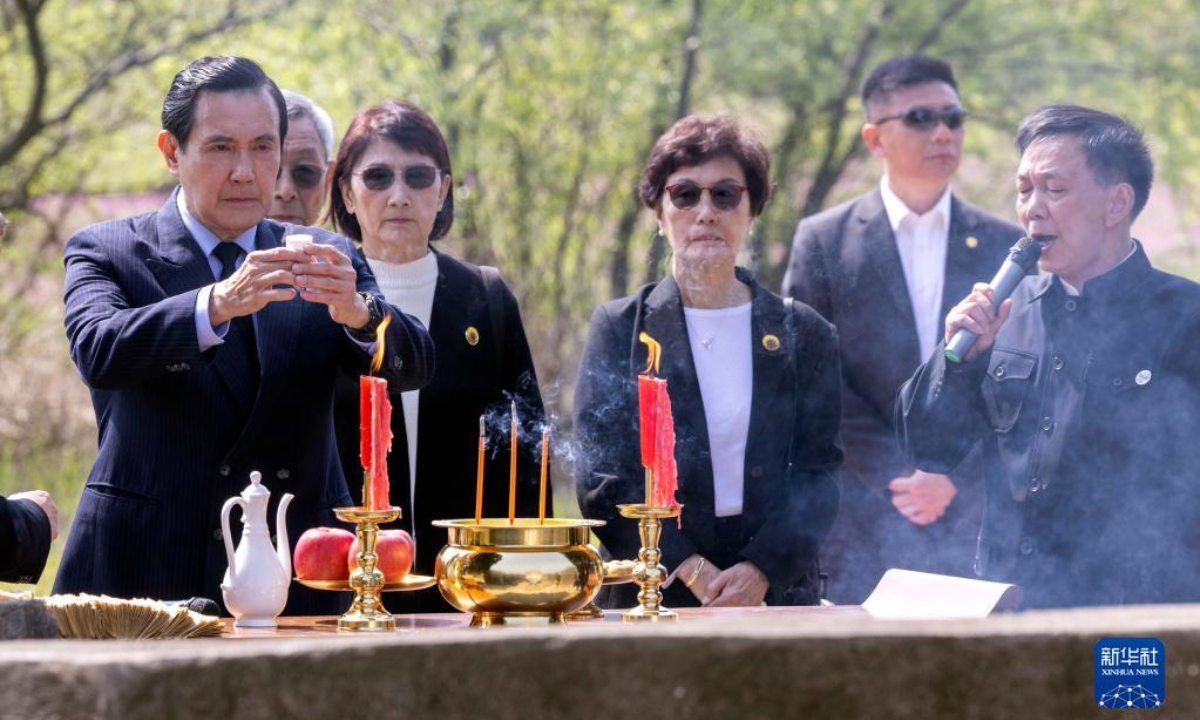
Photo: Xinhua
Amid warm greetings from local villagers, former chairperson of the Chinese Kuomintang (KMT) Ma Ying-jeou and his family members returned to the burial site of ancestors and commemorated his grandfather in Shuangyang village of Xiangtan county in Central China’s Hunan Province on Saturday.
While reading the oration for his ancestors in local dialect, Ma, choking with sobs and said his dream of coming to pay tribute to ancestors came true. He was also deeply touched to see the grave of his grandfather who he had never met.
Respecting funeral rites to commemorate the ancestors is an important part of Chinese people’s education of morality, Ma told the media after the ceremony.
Ma and his family members had received warm greetings from local villagers and Ma also responded in local dialect.
Before arriving at his hometown in Hunan, Ma and his delegation had visited several mainland cities, including Nanjing, Wuhan and Changsha. He will later go to Chongqing and Shanghai before returning to the island of Taiwan on April 7.
Song Tao, head of both the Taiwan Work Office of the Communist Party of China Central Committee and the Taiwan Affairs Office of the State Council, met with Ma in Wuhan, Hubei Province on Thursday.
Song welcomed Ma and several Taiwan compatriots to visit the mainland for more exchanges in the future, and affirming Ma’s contribution to the peaceful development of cross-Straits relations.
Observers said that Ma’s trip to the mainland makes him the first former Taiwan leader to visit the mainland in 74 years, which is expected to write a new chapter in the development of cross-Straits relations.
Global Times
https://www.globaltimes.cn/page/202304/1288390.shtml
Ma jetzt in Chongqing. DieEinheitsfront gegen Japan wird nun herausgestellt .Neben Unternehmern hat er auch viele junge Akademiker mitgenommen. Und sieht da große Perspektiven von Chinas 34- Millionenstadt Chongqing mit Taiwan. Aus Sicht der KP einfach vorbildlich Die Global Times berichet dementsprechend sehr ausführlich über fast jeden Stop seiner Reise, vor allem nun über seinen Chongqingaufenthalt: Die damaiige Einheitsfront gegen Japan wird nun herausgestellt. Neben Unternehmern hat er auch viele junge Akademiker mitgenommen .Aus Sicht der KP einfach vorbildlich.
Ma Ying-jeou expresses high expectations for cross-Straits exchanges while meeting with mainland officials in Chongqing
By Wang Qi
Published: Apr 03, 2023 10:56 PM
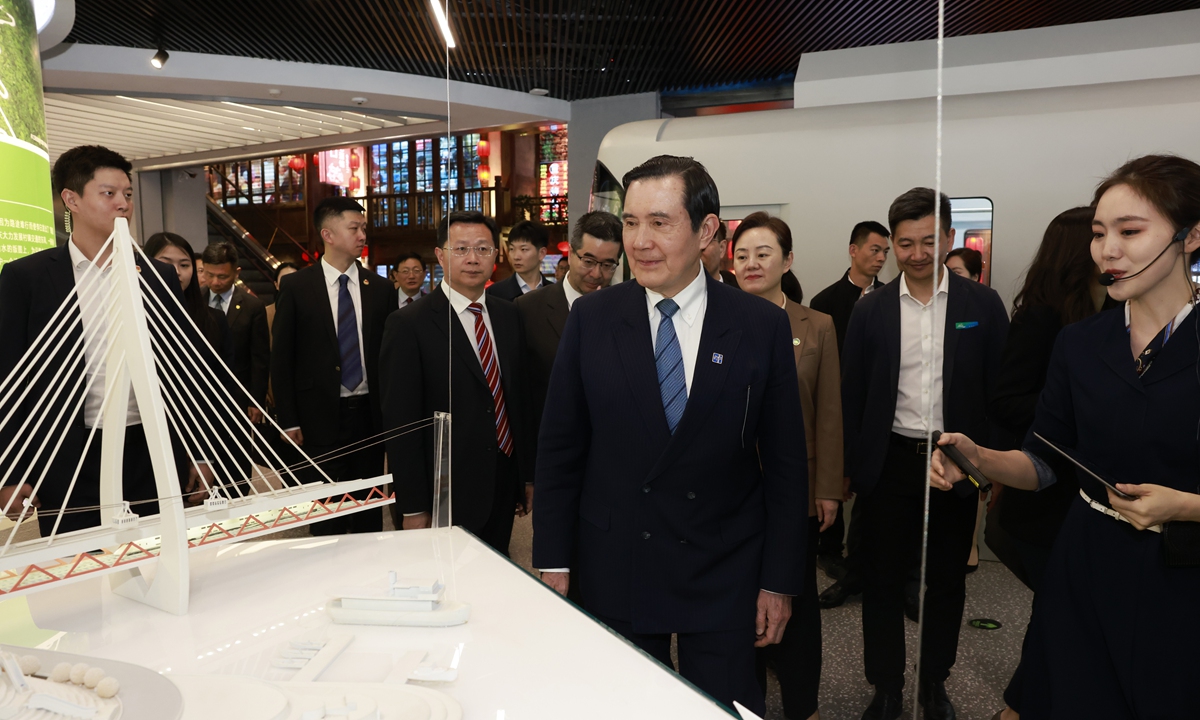
Former chairperson of the Chinese Kuomintang (KMT) party Ma Ying-jeou visits the Chongqing Urban Planning Exhibition Hall in Southwest China’s Chongqing Municipality on April 3, 2023. Photo: VCG
Former chairperson of the Chinese Kuomintang (KMT) party Ma Ying-jeou on Monday expressed high expectations for exchanges and cooperation between Taiwan island and Chongqing Municipality while meeting with mainland officials, as his 12-day ancestral trip in the Chinese mainland entered its fourth major city.
During the meeting with Yuan Jiajun, secretary of the Chongqing Municipal Committee of the Communist Party of China (CPC), Ma said that the modernization of Chongqing is an important factor for attracting Taiwan businesspeople and enterprises to settle down for development and investment and for cross-Straits exchanges.
In the future, Taiwan and Chongqing will have more possibilities for deepening cooperation in new energy, electronic information industry and other fields, Ma said.
Ma left Changsha, Hunan Province and flew to Chongqing on Monday morning. He visited the Chongqing Urban Planning Exhibition Hall and the Three Gorges Museum before meeting with Yuan in the evening. Ma said the visit to the exhibition hall was „quite impressive,“ as his experience as mayor of Taipei taught him how difficult it is to govern a city.
Yuan expressed a warm welcome to Ma’s visit on behalf of the 34 million Chongqing residents. He said it was a great pleasure to meet Ma and his delegation in Chongqing in the warm spring and blooming season, „especially, in an important city that witnessed cooperation between the KMT and the CPC [against Japanese invaders], as well as the intensive economic, trade, cultural and people-to-people exchanges between the mainland and Taiwan.“
Yuan told Ma that he was touched by Ma’s repeated emphasis on adhering to the 1992 Consensus, opposing „Taiwan independence,“ and promoting cross-Straits exchanges and cooperation for win-win development, which is completely consistent with Ma’s long-term experience of promoting cross-Straits opening, exchanges, cooperation and development.
Ma said Chongqing meant a lot to him as his parents had completed their university education there during the War of Resistance against Japanese Aggression (1931-45). Tales of heroism against invaders had been the subject of his bedside stories since childhood, according to Ma.
Ma said he will visit a local museum themed on the war against Japanese invaders on Tuesday with Taiwan students, as „it’s an important site and a shared memory in our Chinese history, and I believe it’s also an important process of reconnecting the two sides of the Straits for young people.“
Yuan said he noted that Ma’s delegation was made up of college students, master’s students and doctoral students, emphasizing that „they are the hope of the future development of our country.“
Ma told Yuan that the exchange activities in Wuhan and Changsha between students from both sides of the Taiwan Straits have been successful, and both sides have the responsibility of keeping such exchanges going and even expanding them into trade, culture and society. „I have very high expectations for the future.“
During Ma’s eight years as Taiwan’s regional leader (2008-2016), the two sides held 11 high-level talks and signed 23 agreements in fields ranging from economy and tourism to flights, including the Economic Cooperation Framework Agreement (ECFA), the most significant free trade agreement signed by both sides of Taiwan Straits in Chongqing in 2010.
Zhang Wensheng, deputy dean of the Taiwan Research Institute at Xiamen University, told the Global Times on Monday that Chongqing, as the provisional wartime capital of the Nationalist government, was home to many KMT memories. In addition, Chongqing, whose economy has been growing steadily in recent years, has become a popular destination for Taiwan investment, as labor and land costs have risen in the mainland’s eastern cities.
After Ma’s visit, young people and businesspeople from Taiwan will pay more attention to Chongqing, and consider it as an option for their work, study and life in the mainland, Zhang said.
There is a close historical connection between Chongqing and Taiwan, and the economic, social and cultural cooperation between the two regions has reached a new stage, said Zhang, noting that Chongqing is playing an increasingly important role in cross-Straits relations.
https://www.globaltimes.cn/page/202304/1288512.shtml
Sinologieprofessor der LMU und Chinaexperte Professor van Ess meinte noch süssifant:
„Enge Kooperation zwischen Chongqing und Taiwan! Würde mich interessieren, ob man Chiang Kaishek jetzt da im Museum sieht. Vor einigen Jahren war er eine große Leerstelle.“
Absolutes Highlight wäre, wenn eine Tschiang- Statue im Museum aufgestellt würde und sein Enkel und jetzige Bürgermeister von Taipeh mit oder ohne Ma Chongqing bereisen würde. Aber vielleicht tut es Nanjing und das weniger historisch belastete Sun-Yatsen- Maosuleum .ja auch. Daher besucht Ma magenls anderer Alternativen jetzterst mal die Gruft des KMT-Generals und „Nationalhelden“ Zhan Zihongg, “Märtyrer“ in der antijapanischen Einheitsfront. Sein Nachkomme mit Ma dabei:
„Ma Ying-jeou pays tribute to natl hero against Japanese invasion in Chongqing, lays wreath, observes silence, bows and sheds tears
By Wang Qi
in Beijing and Wu Wei in Chongqing Published: Apr 04, 2023 02:09 PM Updated: Apr 04, 2023 03:39 PM
· · · ·
Former chairperson of the Chinese Kuomintang (KMT) party Ma Ying-jeou on Tuesday paid a visit to the tomb of KMT general Zhang Zizhong in Southwest China’s Chongqing Municipality. Paying respects to a national hero who died for the country in War of Resistance against Japanese Aggression, Ma could not hide his emotions and choked up several times, wiping away his tears.
General Zhang Zizhong, commander of the 33rd Army Group, was killed during the battle on May 16, 1940. Zhang was the highest-ranked officer killed during the war against Japanese aggression, which lasted from 1937 to 1945. There are roads named after him in Beijing, Shanghai and Tianjin in memorizing the national hero.
Accompanied by Zhang’s grandson Zhang Qingcheng, Ma and his delegation continued to trace the historical memories of the war against Japanese aggression between Chinese people on both sides of the Taiwan Straits in Chongqing, the provisional wartime capital of the Nationalist government.
In the memorial Hall of General Zhang Zizhong, Chinese calligraphy from late Chairman Mao Zedong „Serve the country with loyalty“ is displayed.
After visiting the indoor exhibition which showcases Zhang’s heroic and patriotic experiences, Ma went outdoors and laid wreath at Zhang Zizhong’s tomb, bowed to pay respects and observed a minute of silence. He took out a handkerchief from his pocket to wipe away tears.
In addition to the original protocol of three bows, Ma paid another three bows, highlighting the contribution of general Zhang to Chinese nation and his weight in Ma’s mind.
After paying tribute to general Zhang, Ma left his signature on a bookmark and gave it to grandson Zhang Qingcheng.
„General Zhang suffered a lot,“ Ma said, choking up as he talked to Zhang Qingcheng. „He died a great martyr.“
When asked about why the group visited so many historic sites related to the War of Resistance against Japanese Aggression during Ma’s mainland visits, Hsiao Hsu-tsen, the Director of Ma Ying-jeou Foundation told the Global Times that Ma had always attached great importance to that period of history. „He believes that our ancestors paid so much blood and laid down their lives for our people, and our later generations should not forget it.“
Taiwan students were deeply touched, because of DPP policy, they could not see this history, but after visiting mainland with Ma, they received info that they never received, they are more reflective to real history, and memories of these past heroes and martyrs, Hsiao said.
Chinese suffered much humiliation during the War of Resistance against Japanese Aggression. General Zhang Zizhong showed Chinese national character in preserving and protecting our homeland, a student from Taiwan surnamed Zhan, a member of Ma’s delegation, told the Global Times on Tuesday.
Ma is also expected to visit the historical site of a university in which his parents had completed their university education during the war.
Tales of heroism against invaders had been the subject of his bedside stories since childhood, Ma said during talk with Yuan Jiajun, secretary of the Chongqing Municipal Committee of the Communist Party of China (CPC) on Monday.
Ma told Yuan that visiting historical sites related to anti-Japanese invasion is an important process of reconnecting the two sides of the Straits for young people with shared memories of Chinese people.
https://www.globaltimes.cn/page/202304/1288528.shtml
Mit seinem KMT- General als „Märtyrer“ steht Ma Yingkiu freichlich nicht alleine in Chna, zudem das alles in einen fanatsischen Märtyrerkult zum Qingmin- Destival eingebettet ist und de KP China die Nation und die Jugendlcihen zu den Gedenkstätten für die „revolutionären Märtyrer“ der KP China anteretn und strammstehen lässt.
„Memorial activity paying tribute to revolutionary martyrs kicks off in Beijing
By Li Hao, Published: 2023/4/4 15:02:58
Photo: Li Hao/GT
Editor’s Note:
Memorial activity paying tribute to revolutionary martyrs began at the Museum of the War of Chinese People’s Resistance Against Japanese Aggression in Beijing on April 4, one day ahead of the Qingming Festival, or the Tomb-sweeping Day. Over 600 representatives from all walks of life attended the opening ceremony. The museum has hosted similar educational activities for 15 consecutive years since 2009 during the Qingming Festival.
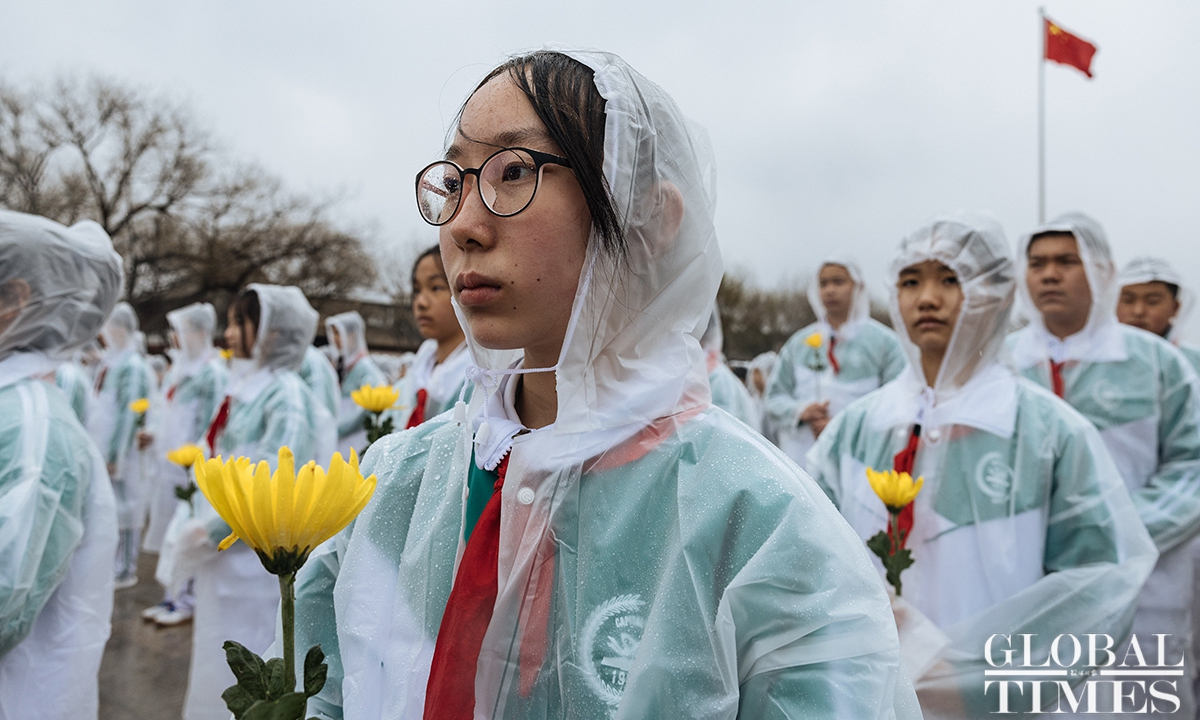 Photo: Li Hao/GT
Photo: Li Hao/GT
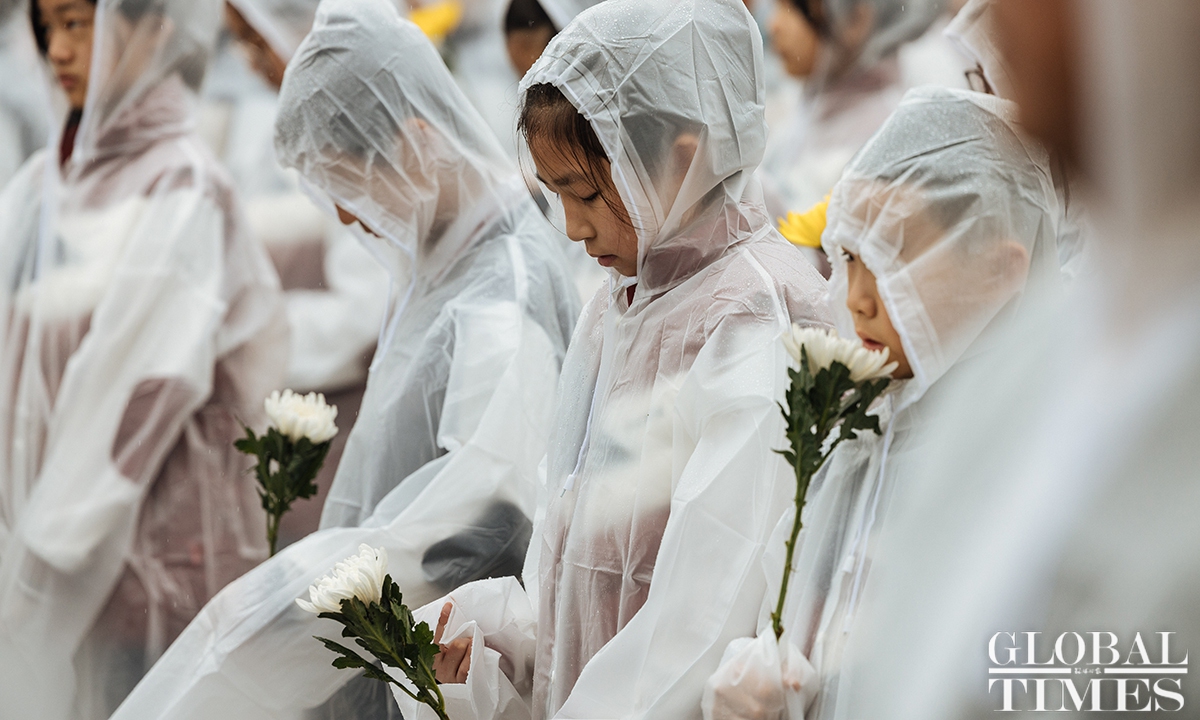 Photo: Li Hao/GT
Photo: Li Hao/GT
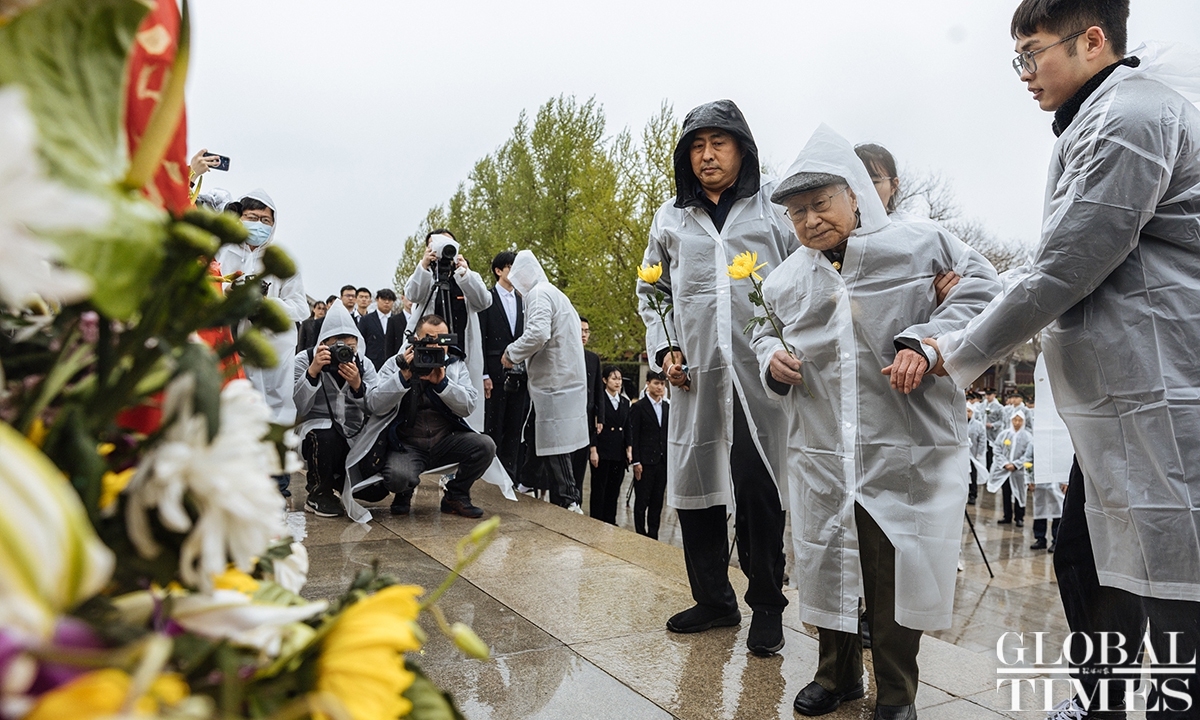 Photo: Li Hao/GT
Photo: Li Hao/GT
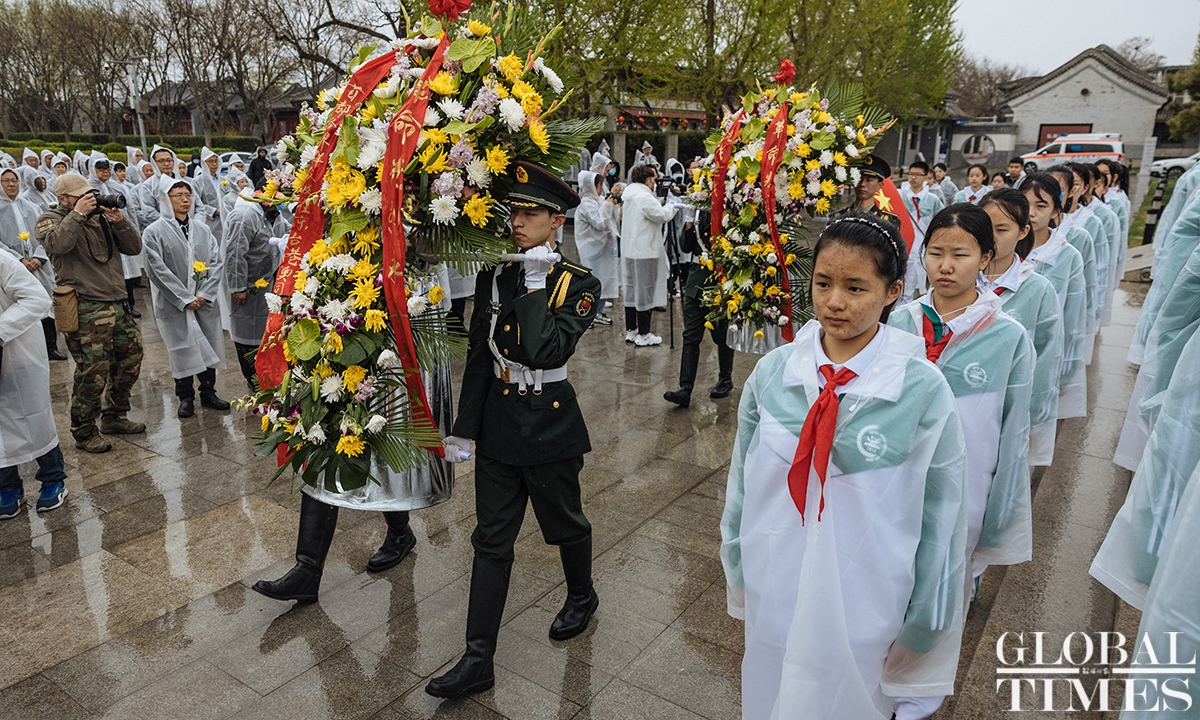 Photo: Li Hao/GT
Photo: Li Hao/GT
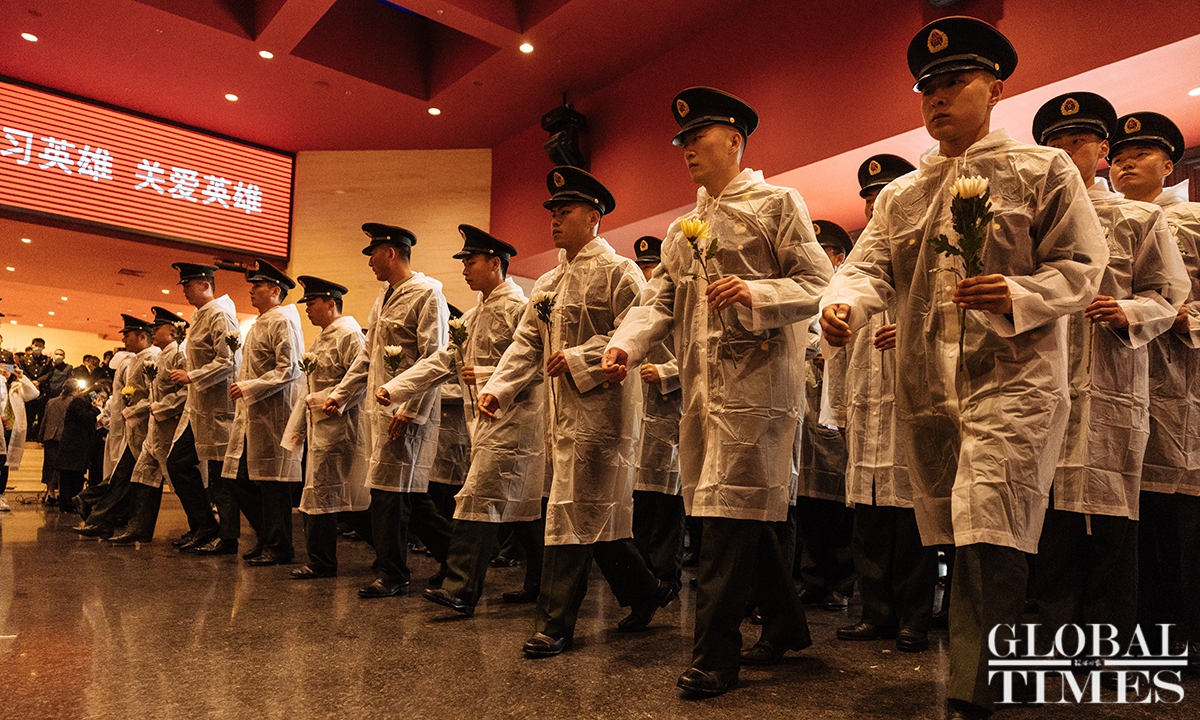 Photo: Li Hao/GT
Photo: Li Hao/GT
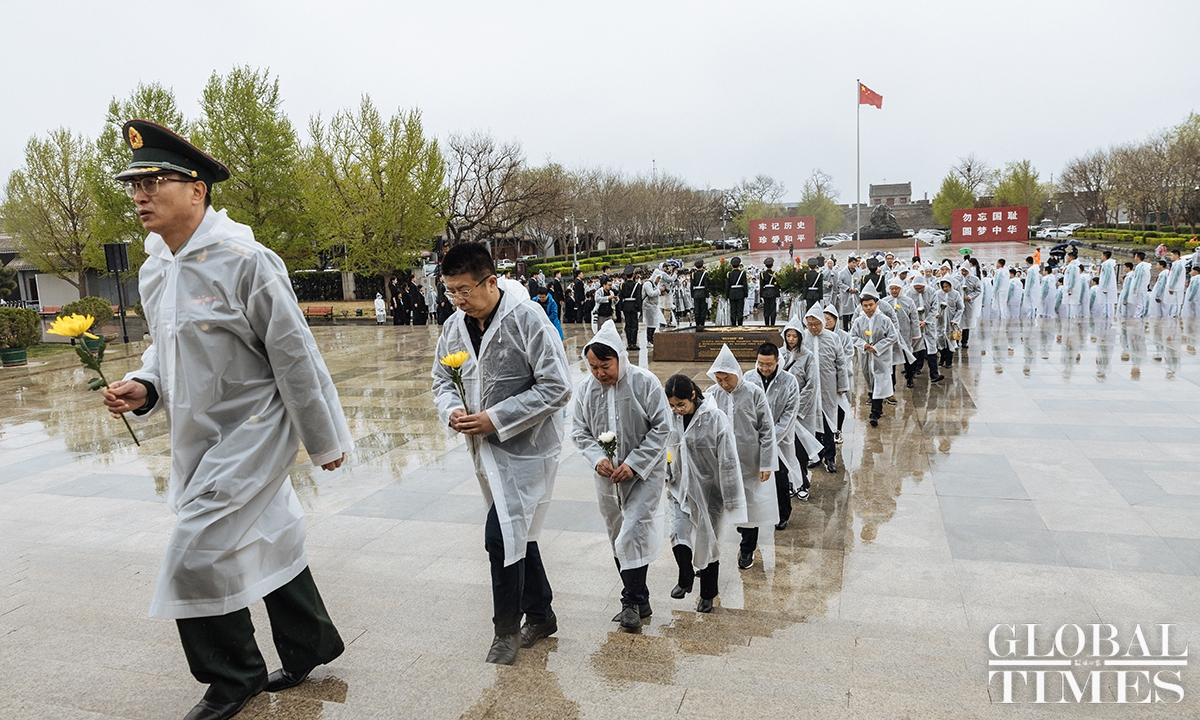 Photo: Li Hao/GT
Photo: Li Hao/GT
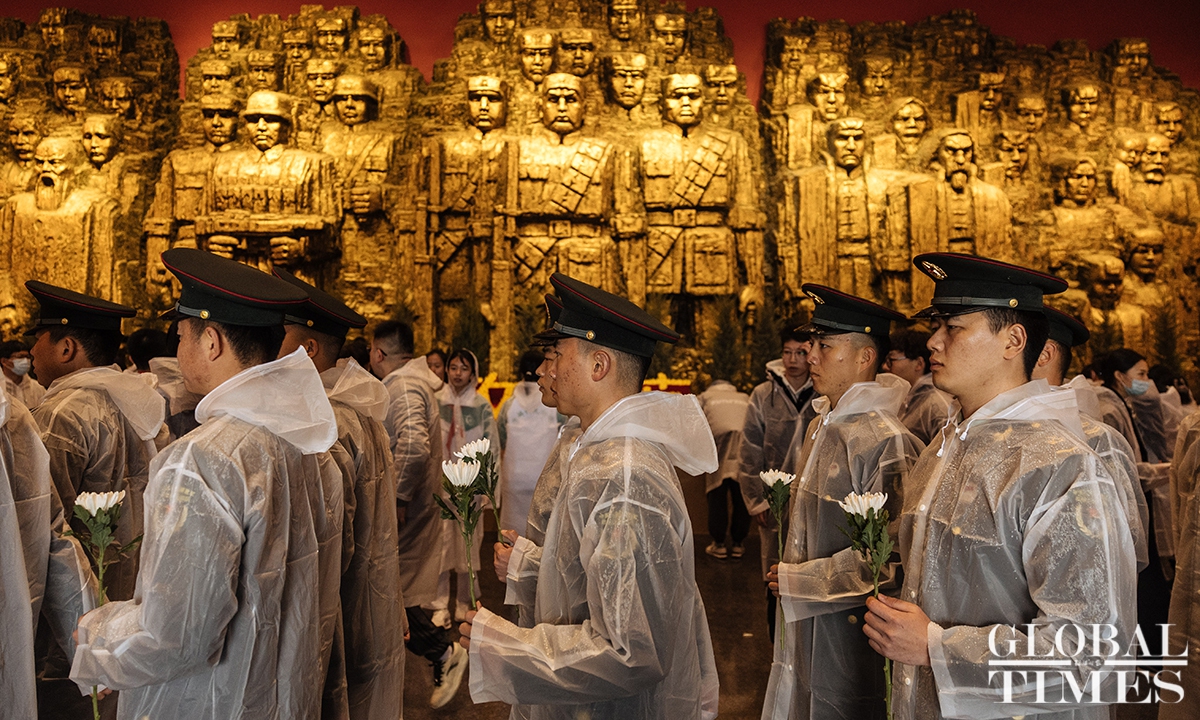 Photo: Li Hao/GT
Photo: Li Hao/GT
https://www.globaltimes.cn/galleries/4614.html
Währenddessen Macron, EU- Kommissionspräsidentin Van der Leyen, Spaniens Ministerpräsident Sanchez, Malaysias Ministerpräsident in China, demnächst folgt Kishida und Mitte April hat sich Baerbock angekündigt. Momentan gibt man sich die Diplomatie die Klinke in Peking in die Hände, auch wegen der Global Security Initiative, der Ukrainekriegsinitiative Pekings , wobei Washington da etwas argwöhnisch auf die chinesischen Versuche blickt, die Europäer von den USA wegbewegen zu wollen und den Westen zu spalten. Bleibt also noch abzuwarten, ob DDP- Tsai Yingwen bei ihrer Rede in den USA brav bleibt oder durch knackige Bemerkungen ala Lee Denghui bei seiner Cornell- Universitätsrede von zwei Staaten in den 90er Jahren eine neue Taiwankrise auslöst jenseits der obligatorischen Drohgebärden der KP China angesichts ihres Treffens mit dem republikanischen Chef des US- Repräsentantenhauses Kevin Mc Carthy hinaus, was einigen Chinahawks wie Bolton, Pompeo, dem Comittee on the Present Danger: China und anderen gerade recht käme, die solche Friedenstäubchen wie Milley und Ma Yingjiu lieber gebraten und gegrillt sehen und zum Frühstück verspeisen würden.